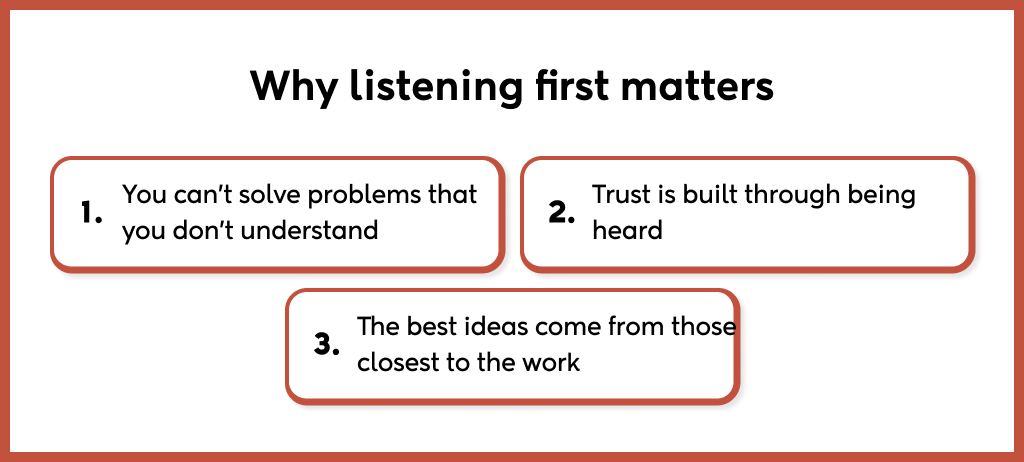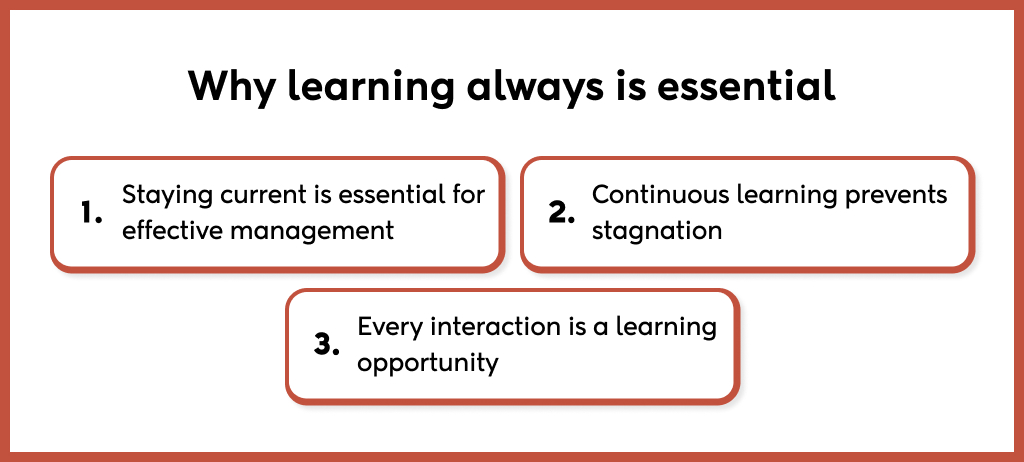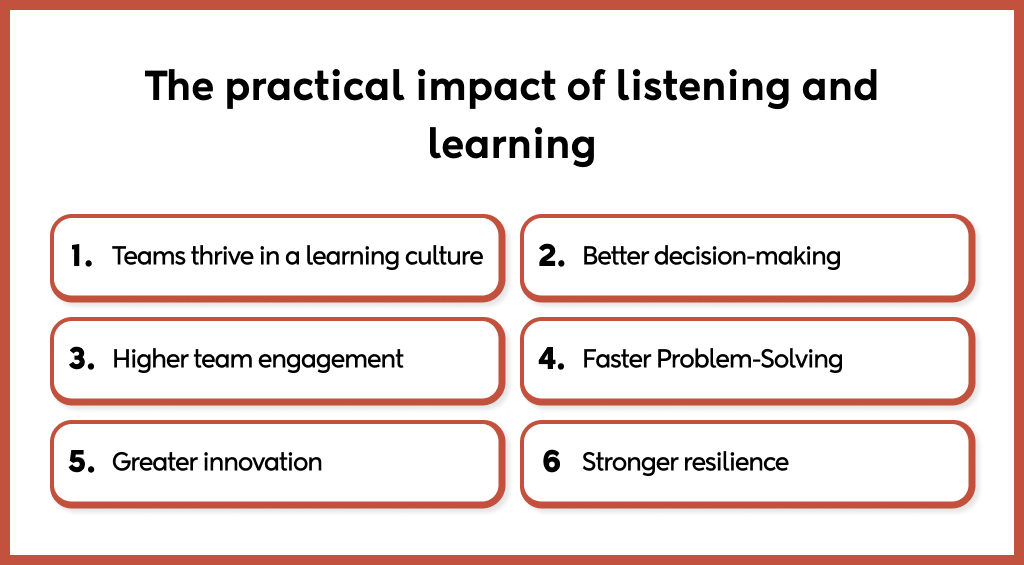Being a manager is often thought of as giving directions, setting goals, and ensuring targets are met. But real management is much more than that. The best managers know that leadership actually starts with listening. By paying close attention to their team, hearing their ideas, concerns, and feedback, they gain valuable insights and create a secure workplace for the team.
Listening alone isn’t enough, though. The most effective managers also keep learning about their team, their work, and themselves. They are always open to new ideas, willing to improve, and ready to adapt when needed.
The combination of active listening and a willingness to improve is what sets great leaders apart. It allows them to understand challenges clearly and make smarter decisions.
In this blog, we will dive into why putting listening first and learning always is not just a good habit, it’s what makes a manager truly great.
Why listening first matters

Listening is a fundamental aspect of communication that should not be underestimated. By listening first before speaking, you can benefit in several ways.
- You can’t solve problems that you don’t understand
If you don’t understand the problem and jump directly to the solution, you will either end up fixing the wrong issue or even making the situation worse. For example, imagine a team member complains about how tasks are being delegated. If you don’t listen to the reasons behind their concern, you might simply redistribute the tasks differently, assuming that’s the solution. But the real issue could be unclear instructions, unrealistic deadlines, or a mismatch in skills.
The best managers approach every conversation with genuine curiosity. They ask questions related to the problem and try to understand the ‘why” behind the problem, like why it happened. Instead of immediately solving the problem, they sit in silence and pay close attention to what to do next.
- Trust is built through being heard
If you ignore the problems of your team, they will start ignoring your decisions too. It’s hard to accept, but people don’t follow managers who don’t listen. When team members feel genuinely heard, it shows them that their opinions matter, that you respect their perspective, and that you care about their challenges. This acknowledgment creates a sense of safety and reliability, which is the foundation of trust. As a result, they become more honest about issues and proactive in bringing up problems early, knowing that you will listen and respond actively.
- The best ideas come from those closest to the work
The team member who actually does the task has a better understanding of the work. When you listen to them, you will uncover practical solutions, discover innovative ideas, and identify potential problems before they escalate. Their insights can help you make smarter decisions, improve processes, and achieve better results because they are the closest to the work and often see what managers alone cannot.
Why learning always is essential

The workplace and team dynamics are always changing, and what worked yesterday may not work today. Here, you will know why learning is essential:
- Staying current is essential for effective management
Staying up to date with industry trends, emerging technologies, and changing customer expectations makes you a more informed and adaptable manager. It allows you to anticipate shifts and make smarter management decisions and guide your team more effectively.
- Continuous learning prevents stagnation
Managers who stop learning risk falling into familiar routines, relying on approaches that worked in the past. This can limit creativity, slow decision-making, and reduce overall team efficiency. By embracing continuous learning, managers keep their perspectives fresh, stay open to new ideas, and ensure that both they and their teams evolve in step with changing business needs.
- Every interaction is a learning opportunity
When you discuss projects with your team, review feedback, or handle challenges, every conversation becomes a chance to learn something new. Each interaction can reveal valuable insights about how your team works, what motivates them, and where processes can improve. These status updates, or one-to-one interactions, turn everyday communication into continuous growth for both the manager and the team.
The practical impact of listening and learning

When you listen and learn actively, you will experience certain impacts, such as improved decision-making, higher engagement among team members, faster problem-solving, and more. Let’s see how it’s beneficial for you:
- Teams thrive in a learning culture
As President John Quincy Adams is said to have proclaimed, “If your actions inspire others to dream more, learn more, do more, and become more, you are a leader.”
When leaders prioritize listening and learning, it sets a powerful example for their teams. To build a team that stays ahead of change, you need to demonstrate a culture of learning, where employees are encouraged to upskill, reskill, and take charge of their tasks.
- Better decision-making
The decisions that leaders make have profound impacts on their organizations. With the benefit of continuous learning, you can base your choices on the latest research, best practices, and a deeper understanding of the complexities of the project.
- Higher team engagement
When team members feel that their ideas and opinions are genuinely heard, they become more connected to their work. They feel valued, respected, and motivated to contribute their best. This sense of involvement increases their commitment, improves productivity, and reduces the chances of them leaving the team.
- Faster Problem-Solving
Listening and learning help you spot problems early—before they turn into bigger issues. When team members feel safe to share challenges openly, solutions can be discussed and implemented quickly. This proactive approach saves time, prevents unnecessary stress, and keeps projects running smoothly.
- Greater innovation
When managers create an environment where people feel safe to speak up and take risks, new ideas begin to flow. Team members are not afraid to experiment or share creative solutions, even if they might fail at first. This culture of psychological safety leads to innovation, helping the team find smarter, more effective ways to work.
- Stronger resilience
A team led by a manager who listens and keeps learning can handle change more confidently. Whether it’s a new tool, process, or challenge, such teams stay flexible and positive. They view change not as a threat but as an opportunity to grow. Over time, this adaptability becomes part of the team’s culture, making them more resilient in the face of uncertainty.
Conclusion
Great managers know that the key to success isn’t just giving directions; it’s listening and learning. Leaders who are dedicated to actively listening and learning can benefit their organization in two ways. First, their teams become more engaged, motivated, and committed to their work because they feel valued and understood. Second, the projects benefit from smarter decision-making and faster problem-solving that drive better results. So keep listening to your team members and always be curious to learn.





















No Comments